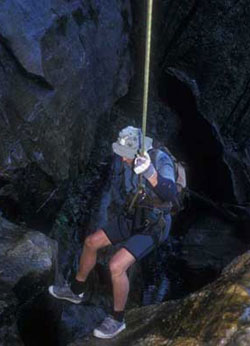Mark Jenkins is a monthly adventure travel columnist for Outside magazine, and the author of three award-winning books: The Hard Way, To Timbuktu and Off the Map. A resident of Wyoming since the age of seven, Jenkins does expeditions into the world’s last remote regions. Hallmarks include the U.S. Everest North Face Expedition (1986), the first ascent of the highest peaks in the Arctic Circle (1988), the first coast-to-coast crossing of the former Soviet Union by bicycle (1989), and the first descent of the Niger River headwaters in West Africa. Prior to his position with Outside, Jenkins was the adventure/investigative editor for Men’s Health, Rocky Mountain editor for Backpacker, and a freelance journalist working in Africa for Time, Reuters, VOA and Deutsch Press Agency. Jenkins’ story about his secret journeys into Burma, “Ghost Road,” was recently selected by Pico Iyer for inclusion in The Best American Travel Writing 2004. Mark Jenkins lives in Laramie, Wyoming with his wife, Sue Ibarra, and two daughters, Addi and Teal.
How did you get started traveling?
My father, a mathematician, took a sabbatical in northern Holland when I was thirteen. He and Mom moved the entire family — six kids — from the high dry plains of Wyoming to the enduring verdure of below sea-level polders. All six of us were put directly into Dutch schools. We didn’t speak a word. A year later we were fluent. Upon moving back to Wyoming I was mortally infected with wanderlust. I began hitchhiking, with my parents’ blessing believe it or not, when I was fifteen. Left high school early to spend six months hitching around Europe, Africa and Russia. Haven’t stopped since.
How did you get started writing?
In 1982 I obtained a degree in Philosophy (existentialism, Kierkegaard, Nietzsche, Heidegger), only to realize that I was a couple thousand years too late and that Aristotle was the last person to actually make a living off the stuff. Moved into a 12′ x 12′ cabin set at 10,000 feet in the snowdrifts of the Medicine Bow Mountains of Wyoming with my girlfriend and a typewriter. Started to write. Sold my first story in 1983. Was about map and compass use. I’m still trying to find my way.
What do you consider your first “break” as a writer?
John Viehman, then editor of Backpacker magazine, hired me out of the world of freelance writing to be the managing editor of two national magazines, Cross Country Skier and Adventure Travel. I knew nothing about the internal workings of a magazine. Did the job for only one year, then went back to writing — but from then on I understood the business of magazines.
As a traveler and fact/story gatherer, what is your biggest challenge on the road?
Documentation. I shoot pics all day long, then write notes by headlamp in the tent at night.
What is your biggest challenge in the writing process?
Trying to capture the spirit of the experience in language.
What is your biggest challenge from a business standpoint?
Taxes.
Have you ever done other work to make ends meet?
My God, of course! It took me years to make something more than a PBJ-and-sardines living from nailing sentences together. As a youth I did all the classic Western jobs. I worked on ranches, I worked on the railroad — three times, once as a gandy dancer — worked on oil rigs, worked construction. Later I worked ten hours a day as a steeplejack or tinner (a guy who puts in heating ducts), and wrote stories at night and on weekends. I still consider myself extremely fortunate to make a full-time living from writing.
What travel authors or books might you recommend and/or have influenced you?
Homer, Conrad, Nietzche, Jack London, Hemingway, Heidegger, Faulkner, Ryszard Kapuscinski, J.M. Coetzee, Jonathan Raban, Bruce Chatwin, and Tobias Wolff to name but a few.
What advice and/or warnings would you give to someone who is considering going into travel writing?
You must love writing more than you love travel.
What is the biggest reward of life as a travel writer?
Encounters with extraordinary people.

